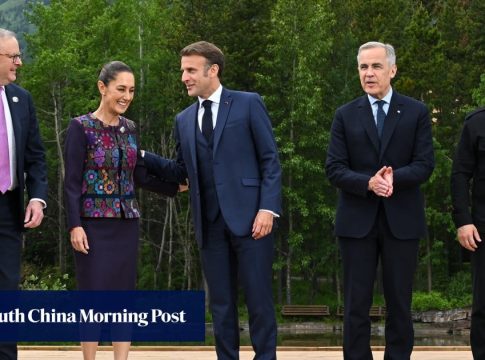G7 Summit: A Delicate Balance in Political Messaging on Russia
In a notable turn of events, a recent summit of the G7 countries revealed the complexities of international diplomacy amidst ongoing geopolitical tensions. The discussions were marked by a significant friction between the United States and its allies over the wording of a proposed statement condemning Russia’s actions in Ukraine.
Tensions Under the Surface
According to reports, discussions around the G7 statement hit a snag when U.S. President Donald Trump pushed against strong language condemning Russia. An anonymous Canadian official indicated that the original proposal aimed to hold Russia accountable more definitively, echoing prior G7 positions. Historically, this type of condemnation has been commonplace following Russia’s annexation of Crimea in 2014. However, Trump’s administration argued that such strong rhetoric could restrict their negotiating power in future dealings with Moscow.
Notably, this situation highlights a broader issue: the evolving stance of the U.S. in the global order, particularly under Trump’s leadership, which has often favored a more conciliatory approach towards Russia. This shift may be reflective of a larger trend within global politics where traditional alliances are tested amid rising nationalism and individual leadership styles.
Allies Push Back
The other G7 nations—Canada, France, Germany, Italy, Japan, and the United Kingdom—expressed their discontent with the altered statement. They felt the diluted language did not fairly represent their shared commitment to supporting Ukraine and condemning Russia’s aggression. As a compromise, Canadian Prime Minister Mark Carney stepped in to voice the collective stance of the G6 countries while Trump exited the summit early to address the escalating tensions between Israel and Iran.
This interplay of diplomatic maneuvering underscores a reality where member nations may sometimes find themselves at odds, even while ostensibly united in purpose. Such dynamics could have far-reaching implications for international cooperation on issues extending beyond just Ukraine, affecting economic sanctions, military support, and humanitarian efforts in conflict zones.
Broader Implications on Global Relations
This moment at the G7 summit serves as a reminder of the shifting landscape in global politics, where the influence of individual leaders can reshape long-standing alliances. As countries grapple with both domestic pressures and international responsibilities, the delicate nature of these relationships will be tested, particularly as conflicts evolve.
Moreover, the reactions from G7 nations illustrate a growing frustration over the need for a unified stance. This is particularly relevant in an era where global crises—such as pandemics, climate change, and technological disruptions—demand collaborative action more than ever.
In conclusion, the G7 summit not only highlighted the intricacies of current geopolitical challenges but also set the stage for future dialogues about the balance of power within international relations. As the world watches Washington’s evolving relationship with its allies and adversaries, the implications of these choices will resonate far beyond the confines of Canada’s breathtaking landscapes.

Writes about personal finance, side hustles, gadgets, and tech innovation.
Bio: Priya specializes in making complex financial and tech topics easy to digest, with experience in fintech and consumer reviews.

